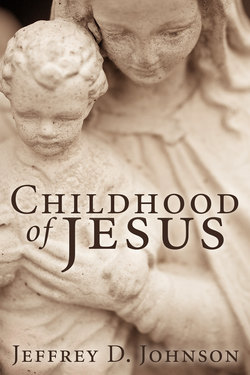Читать книгу Childhood of Jesus (Stapled Booklet) - Jeffrey D. Johnson - Страница 4
На сайте Литреса книга снята с продажи.
Childhood of Jesus
ОглавлениеAnselm of Canterbury (ca. 1033–1109) commented regarding the virgin birth of the Messiah: “Exercise your pictorial art, then, not on an empty fiction, but upon a solid truth, and say that it is extremely fitting that, as the sin of man and the cause of our condemnation took their origin from a woman, so the cure for sin and the cause of our salvation must be born of a woman. And so that women may not despair of attaining to the lot of the blessed, because such great evil has issued from a woman, it was fitting that such a great good should issue from a woman, to revitalize their hope. Add this to your painting: If it was a virgin who was the cause of all evil to the human race, it is far more fitting that it be a virgin who will be the cause of all good. Depict this also: If the woman whom God made from a man without a woman was made from a virgin, it is also extremely fitting that the man who will originate from a woman without a man be born of a virgin. But for the present, let these examples suffice of the pictures that can be depicted on the fact that the God-man must be born of a virgin woman” (Zondervan 1996: 1176).
Not much is recorded for us in the New Testament about the life of Jesus between his birth and the scene where he is in the Temple talking with the scholars, nor is there much written about his life between his time in the Temple and the beginning of his ministry at the age of 30. What was he doing during those “silent years?”
As one looks at the record, according to Scripture, of the Lord’s life and teaching, you will find a Jewish cultural distinctive. You will find a deep commitment to the Jewish customs and beliefs of his day. Jesus grew up in a Jewish family setting. His parents observed Jewish Law and religious practices. Jesus would have celebrated all the Jewish holidays. He would have been faithful in observing the Sabbath, regularly attending synagogue as well as being exposed to rabbinical teaching and expectations (Matthew 1; Luke 2; Luke 4).
Some believe that Jesus was not educated, due to a few verses such as “‘Can any good thing come out of Nazareth?’ And they were all amazed and marveled, saying, ‘ . . . Are not all these which speak Galileans?’ And the [religious] Jews marveled, saying, ‘How does this man know letters, having never studied?’” (John 1:46; Acts 2:7; John 7:15). These statements reflected a tension and intolerance between Judea and Galilee. Those in Judea saw themselves as being more sophisticated than their Galilean counterparts. They saw the Galileans as being backward and ignorant. When a Judean heard a Galilean speak, they heard a dolt’s voice.
The truth of the matter, according to Shmuel Safrai, Hebrew University Professor of Jewish History of the Mishnaic and Talmudic Periods, stated, “Not only do the number of first-century Galilean sages exceed the number of Judean sages, but the moral and ethical quality of their teaching is still considered more highly than that of their Judean counterparts” (Bivin 1993).
Galilee would have been the conservative religious and political bastion of Israel. Anticipation for the advent of Messiah was very high in this region. Now, with this background in mind, let’s consider Luke’s account of Jesus’ childhood in Luke 2:40–52 and draw some conclusions.
